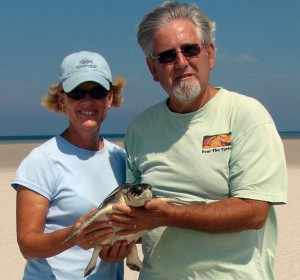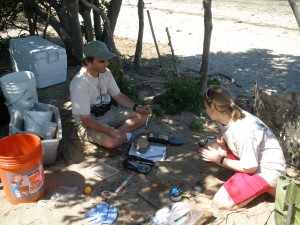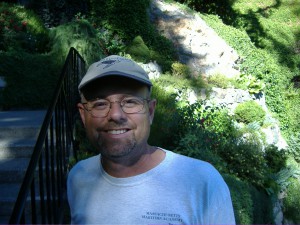Terrapin Week: Spotlighting our Partners!
This story marks the last of our five blog stories spotlighting New Jersey’s Diamondback Terrapin – and educating people on the research and efforts being done to protect these fascinating reptiles!
Part 1, Monday, was an introduction into the world of the Diamondback Terrapin. Part 2, Tuesday, featured CWF’s research efforts to protect the terrapins. Part 3, Wednesday, looked at great places to view these beautiful turtles . Part 4, Thursday, highlighted some important ways you can help protect the Diamondback Terrapins. Part 5, today’s post, will showcase some other important regional research being done by our partners.
Beyond New Jersey: Diamondback Terrapins across the Northeast
By Stephanie Egger, CWF Wildlife Biologist
Contributions by Don Lewis (Cape Cod Consultants), Russ Burke (Jamaica Bay Terrapin Research and Conservation), and John Wnek (Project Terrapin)
Conserving the Northern diamondback terrapin in New Jersey is vitally important to CWF and our partners. As a result, it is crucial that we work cooperatively with our partners in the Northeast for the long-term protection and sustainability of terrapins from a regional perspective.
The terrapin has been identified as a Species of Greatest Conservation Need in the Northeast States Wildlife Action Plans (WAP). The terrapin is found in eight states of the Northeast /mid-Atlantic regions and are considered Threatened in Massachusetts and Endangered in Rhode Island under State laws. In New Jersey, while the terrapin receives some protection under commercial and recreational fishing regulations, it is also considered a game species. The species has been also identified by the Northeast Partners in Amphibian and Reptile Conservation (NEPARC) as a species of regional conservation concern in the Northeast Amphibian and Reptile Species of Regional Responsibility and Conservation Concern Report as it found in ≥ 75 % of states listed in their WAPs and > 50% of northern diamondback terrapin distribution is within the Northeast Region of North America (NEPARC 2010).
Our regional partners have invested many years into the survival of this species through their conservation and research efforts below and as partners in the development of the Northeast Regional Conservation Strategy for Terrapins headed by CWF.
Cape Cod, Massachusetts – our northernmost terrapins

In Wellfleet Bay on Outer Cape Cod resides the northernmost population of diamondback terrapins. Research on these elusive critters began in June 1980, and this longitudinal study has continued uninterrupted through this, its 35th season. Terrapin research and conservation in Massachusetts encompasses more than 250 miles of coastline, dozens of estuaries and hundreds of sites from the fist of Cape Cod through Buzzards Bay on the South Coast to Mount Hope Bay on the Rhode Island border. Within this expanse, there are many vestigial groups on the cusp of extirpation and a few stable populations. Intense conservation measures over the last decade and a half have reversed statewide population declines, and numbers have begun slowly, yet steadily to increase throughout the range. These measures focus on dramatically increasing the number of hatchlings entering the system through protecting nests and shepherding hatchlings from wild nests through a gauntlet of predators to the safety of their nursery salt marsh. We also strive to expand nesting habitat through uplands preservation and coastal turtle gardens. The result has been a significant, measurable increase in juvenile recruits entering these populations.
Covering this broad expanse of estuaries and beaches entails a large volunteer effort of citizen scientists augmented by hundreds of homeowners within coastal communities throughout Massachusetts. Outreach forms the cornerstone of terrapin conservation. Whether formal in classrooms or informal on beaches and in backyards, hands-on educational experiences transform bystanders into supporters. The goal of each encounter is simply to change personal pronouns from “your turtles” to “our turtles.”
When terrapin activity ends in October, staff and volunteers change into winter garb and return to now frigid Cape Cod beaches to save stranded, cold-stunned sea turtles. Each fall hundreds of sea turtles get trapped in the enormous “seine net” of Cape Cod sticking forty miles into the Atlantic Ocean, and they become too cold to survive without human intervention. Thousands of the most endangered sea turtles in the world have been recovered from Cape beaches, rehabilitated and returned back to the ocean.
Jamaica Bay, New York

Alex Kanonik (Queen’s College) and Russell Burke (Hofstra University) run a citizen-science project focusing on the ecology of the diamondback terrapin population in Jamaica Bay, New York. Our work is built around a mark-recapture project started in 1998, and has been the basis for nine M.S. theses and numerous publications co-authored by high school students, undergraduates, and graduate students. Our early focus was on nesting ecology and nest predation, then hatchling behavior, and field tests of temperature sex determination. Currently we are investigating terrapin diets, movements and distribution in Jamaica Bay and elsewhere in New York. We also work closely with biologists at JFK airport to address their issues with terrapins on the runways.
Barnegat Bay, New Jersey

Project Terrapin, through the Marine Academy of Technology and Environmental Science, New Jersey, is conducting its 13th year of diamondback terrapin nesting research at Barnegat Bay, New Jersey. We are studying the reproductive output of terrapins throughout Barnegat Bay with an emphasis on populations at Island Beach State Park and Long Beach Island, New Jersey.
We are also studying populations by identifying critical habitat throughout the Barnegat Bay Estuary. We conduct a mark and recapture study throughout the northern Barnegat Bay region. The past two years, we have been focusing on possible impacts on nesting ecology as a result of “shifting” nesting habitats from the storm surge from post-tropical cyclone Sandy. We are also mapping nesting areas throughout the system.
Our team has a few different conservation projects, including the establishment of nesting habitats in areas where there are a high density of nesting terrapins in developed coastal communities. We also sponsor a bycatch reduction device (BRD) distribution program working with local crab pot retailers and manufacturers. To date, we’ve distributed over 20,000 BRDs throughout Ocean County, New Jersey.
We are also working with local environmental education centers and schools to promote diamondback terrapin education, with an emphasis on habitat and the importance of protecting our barrier islands. Project Terrapin has developed an education module called the Terrapin Education KIT used by informal and formal educators. Finally, we also sponsor a hatchling head start program for schools throughout the state and eastern Pennsylvania.
Our latest initiative is to assist with the protection of our barrier islands by promoting and funding coastal vegetation plantings so that the dunes and coastal habitats are better stabilized. This past year, we have reached over 6,000 people, including school students, with volunteers providing over 1100 hours. Project Terrapin works with several colleges and universities supporting both graduate and undergraduate research studies.
Contact information for our partners:
Cape Cod (MA)
Don Lewis & Sue Wieber Nourse, Turtle Journal and Facebook, (508) 274-5108
Bob Prescott, Director, Mass Audubon Wellfleet Bay Wildlife Sanctuary, (508) 349-2615
Jamaica Bay (NY)
Russ Burke, Hofstra University and Facebook
Barnegat Bay (NJ)
John Wnek, Marine Academy of Science and Technology, Project Terrapin, and Facebook
References
NEPARC. 2010. Northeast Amphibian and Reptile Species of Regional Responsibility and Conservation Concern. Northeast Partners in Amphibian and Reptile Conservation (NEPARC). Publication 2010-1.
Stephanie Egger is a Wildlife Biologist for Conserve Wildlife Foundation of NJ and Co-Chair of the Mid-Atlantic region of the Diamondback Terrapin Working Group
Discover more from Conserve Wildlife Foundation of NJ
Subscribe to get the latest posts sent to your email.